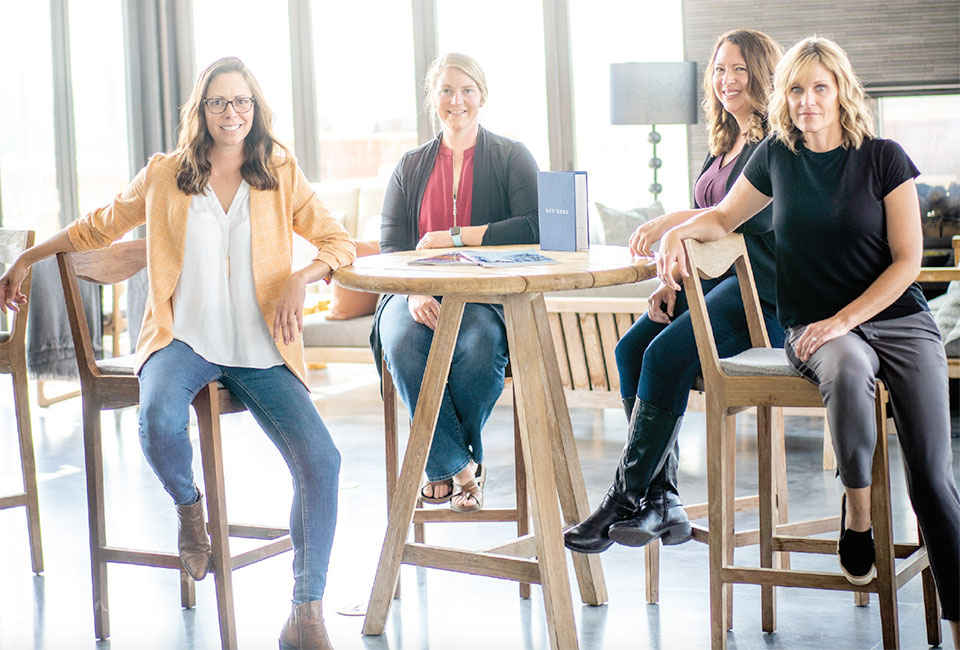Influencers of Montana’s Built-Space
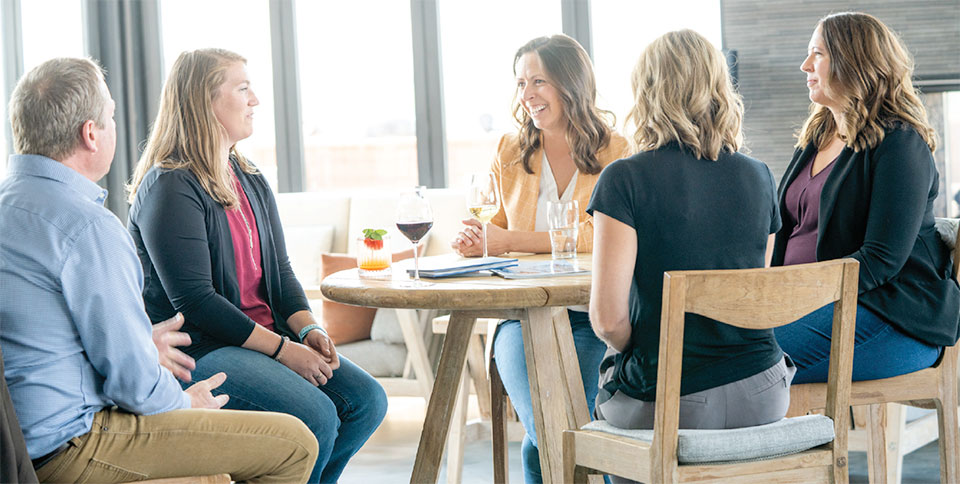
From pounding nails at the jobsite to engineering mega-structures, women continue to influence how space is built. Western Home Journal profiles four talented professionals who contribute to southwest Montana’s own brand of architecture, design, and construction.
In the fall of 2021, the panel met in the Sky Shed of the Kimpton Armory Hotel in downtown Bozeman to discuss the state of building in the region, their roles in their respective companies, and women’s contribution to the construction industry. With craft cocktails and bartender-selected wines in hand, the conversation began with introductions and morphed into dialogue that was at times self-reflective, other times humorous, but always insightful.
Meet the roundtable: A civil engineer by training, Jackie Kline functions as a superintendent for Teton Heritage Builders, a Bozeman- and Jackson-based custom homebuilder. A principal architect at Bozeman-based Studio Architects, Leah Shute leads an architectural design team on projects that range from custom residences to resort developments. An owner of Premier Air, Michelle Dammen operates a Bozeman- and Helena-based plumbing and HVAC (heating, ventilation, and air conditioning) company. With a business and construction administration background, Allison Wilfling is a senior project manager for Highline Partners, a Bozeman- and Big Sky-based custom homebuilder.
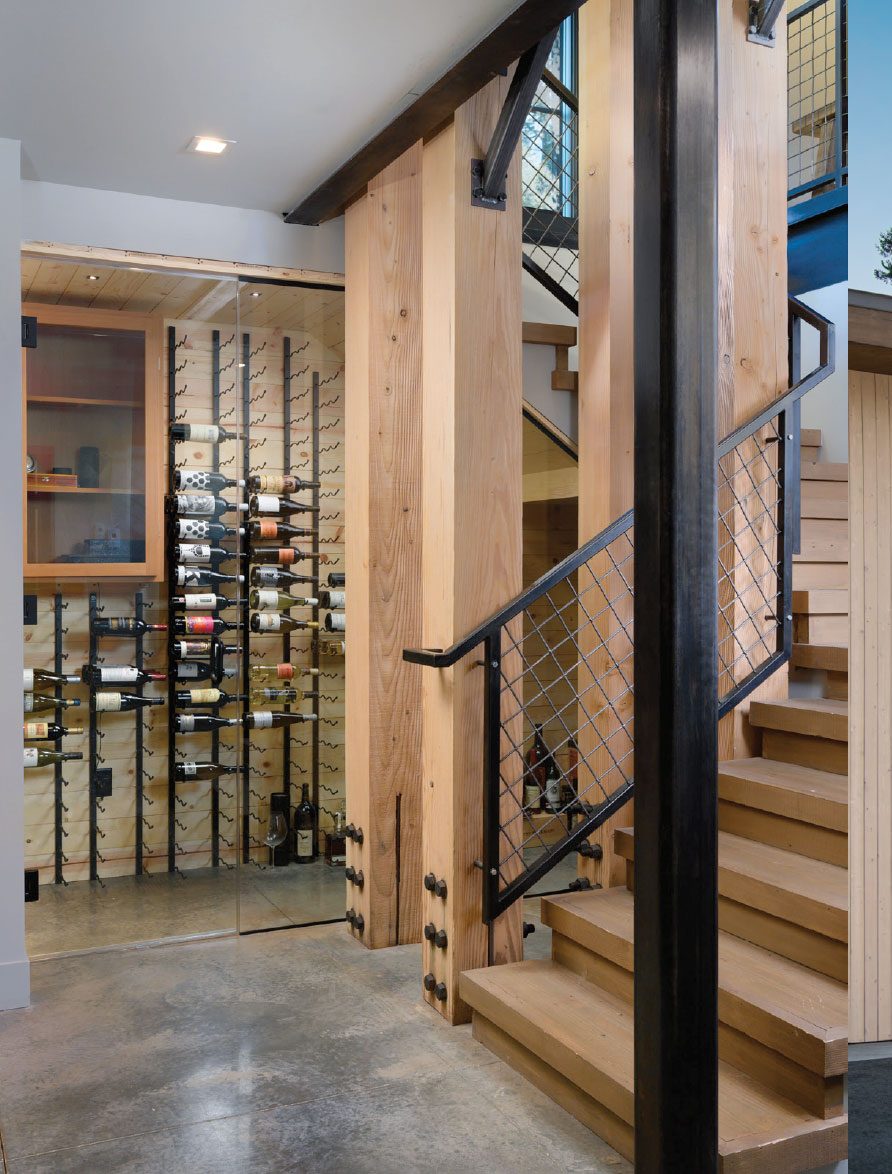
whj: Share with us a little about your personal and professional backgrounds.
Jackie Kline (Teton Heritage Builders): I grew up in upstate New York, west of Albany. I’m a big skier so I made my way to the University of Vermont and, in between my time on the slopes, managed to get a civil engineering degree. Naturally, the ski mountains of Montana drew me west and I’ve been here nine years.
During my early days in Bozeman, I worked for a remodeling contractor on the crew. Getting my hands dirty on the job sites was actually really fun and a really great experience for my current job as a superintendent. I did it all—framing, setting tile, building decks, staining trim, sheetrock, flooring…
I saw a job for an assistant at Teton Heritage Builders. I thought, “Geez, this will be easy.” After all, I have a civil engineering degree. Boy, was I wrong. Don’t ever underestimate any position in a construction company. Every job has challenges. I’ve moved my way up to superintendent and all that experience is relevant to my job today.
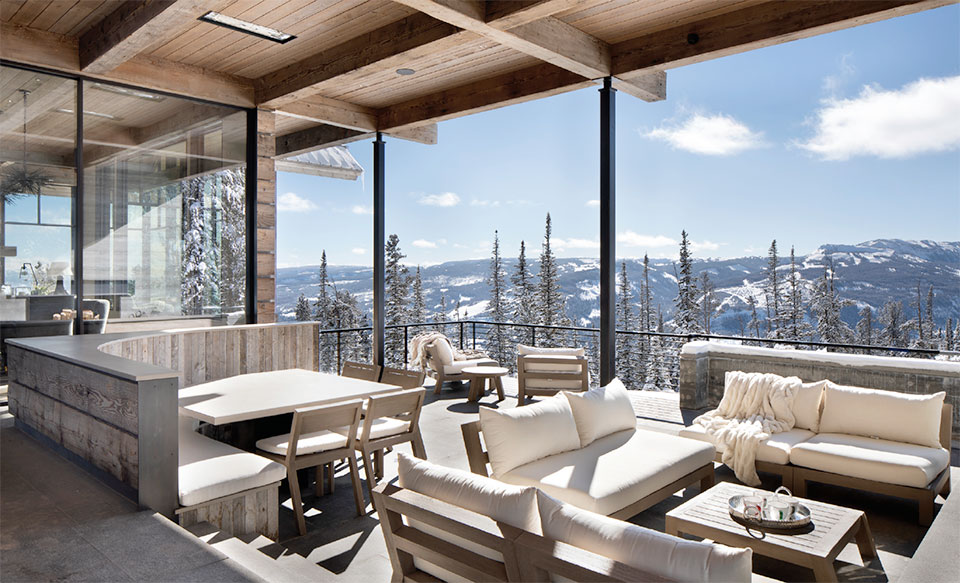
Allison Wilfling (Highline Partners): I too grew up in upstate New York and one of my first jobs as a teenager was with a concrete and masonry company. I worked in the yard loading the foremen’s trucks with all the equipment and supplies that they needed. Later in college, I worked in the office in HR and estimating departments. My natural trajectory was that I was going to manage a concrete company.
I went to college to play lacrosse and majored in business administration with an emphasis in sports management. After graduating, I fell in love with a guy and moved to Montana with him. The guy didn’t stick but Montana did. In fact, Montana was the best thing to come out of that relationship.
My first job here in Bozeman was with Kenyon-Noble Hardware & Lumber when the retail store was on Mendenhall and Black downtown. I worked at the contractor’s desk so I got to know every contractor. My dad questioned my job position, asking, “What are you doing working at a hardware store? You have a college degree.” After exactly one year at Kenyon-Noble, I started working for construction companies including SBC | Schlauch Bottcher Construction and others. I got to know Todd Thesing and Rob McRae while working together at CK Design & Construction in Big Sky. They later formed Highline Partners where I work as a project manager today.
Michelle Dammen (Premier Air): I grew up in Kalispell, part of a multi-generation Montana farming family. I came to Bozeman for school at MSU and got my BS and MS degrees in agricultural relations and education. One of my first jobs out of college was working for the county for $8.50 an hour. I helped farmers with business development… yes, $8.50 an hour for a professional with a college degree.
My husband went to school in architecture. He was working on construction projects in North Dakota during the oil boom and he was traveling back and forth. We wanted to start a family and needed to have a stable home base. We both recognized the importance of being involved in the raising of children. We jumped into this HVAC business when we only had two months of living expenses in our bank account. Sink or swim here we go. Now, eight years later, we have over 30 employees and recently expanded into the Helena area and added a plumbing division.
Leah Shute (Studio Architects): I wanted to be an architect since I was nine years old. I was drawn to the diversity of structures and buildings. I grew up in Cody, Wyoming, but my parents lived in Germany before they came West. Most of my extended family was back East, in the Philadelphia area. As a young person, I was exposed to history, culture, and art through building—the Old World structures in Europe, architecture from the East Coast, and finally the American West, where all the architecture is relatively young.
I came to Bozeman for architecture and here I still am. For the past 25-plus years, I’ve been a practicing architect and am a managing partner with Studio Architects. I have led our team to tackle some really interesting—as well as some really challenging—projects. Our work ranges: custom residential, education, healthcare, hospitality, resort development… The work continues to evolve design-wise and technology-wise. I love the diversity of our work and I’m always looking for the next architectural adventure.
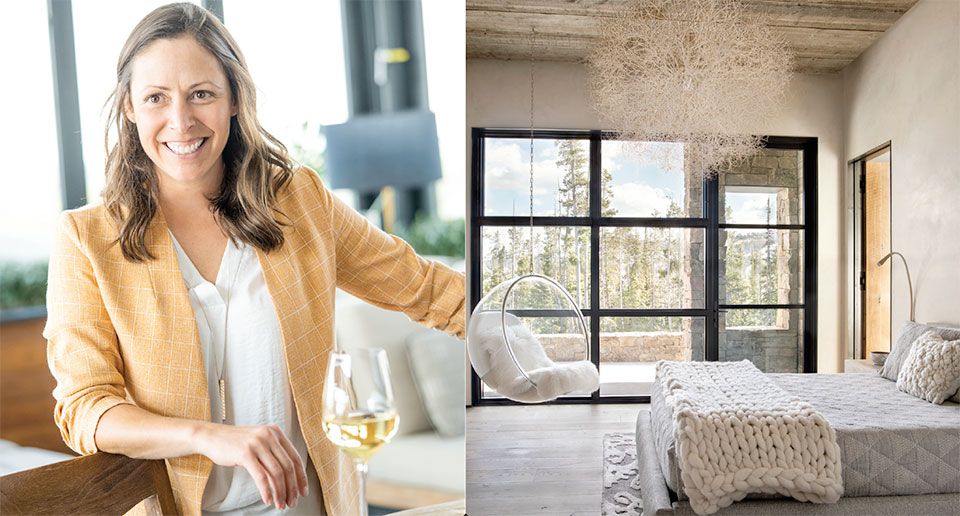
“Personal connections will build trust and make it easier when things aren’t going well… and trust us, every day something doesn’t go well.”
–Allison Wilfling, Senior Project Manager, Highline Partners
whj: What are your current business challenges?
Allison: The current business challenge is too much business… a good problem to have. What we’re seeing is not just in Montana, but across the country and world. That is supply chain disruptions and labor shortages. We need product and labor in place to move forward. When these two things are uncertain, you can’t maintain a predictable construction schedule. Among our solutions is to be even better communicators during every step of the process.
Jackie: These challenges are particularly difficult in high-end custom residential. The client may have a multimillion-dollar budget but when construction products are back-ordered, there is little you can do. Raw materials like lumber and steel are in high demand; factories are backlogged across the globe; ships, rail cars, and trucks are at capacity. Furthermore, you need to have the skilled labor to install it once it arrives in Montana and all of our vendor partners and subcontractors are stretched so thin as it is.
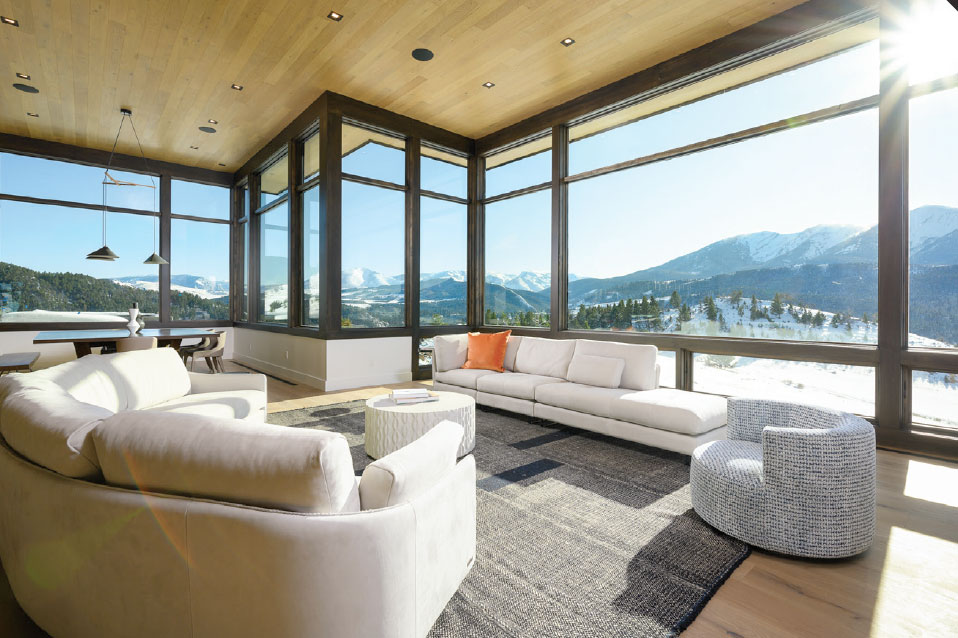
Leah: We have to adjust some of our initial promises to our clients. While the architectural plans may be complete, we have to let the client know the bidding and construction timelines need to be adjusted or extended. The challenge is communicating well, checking in with all involved, and adjusting expectations. Because we have good relationships with both our clients and partners, most people are understanding.
Allison: We used to send out RFPs (Requests for Proposals) and get them back in two weeks, but now it is six weeks. We ask, “Why is it 40% more expensive?” Prices change weekly, which makes the contracting difficult.
Now I have to tell designers and architects, we need things much earlier. I used to tell architects like Leah that we needed the plans six months in advance and the specs two months in advance. Now I’m asking for them a year or more in advance.
Michelle: With more than enough work, we don’t want to tax our employees beyond a typical 40-hour work week. We work four ten-hour days with options for overtime on Fridays. Our biggest asset is our crew. Hiring a trained technician is difficult, so retaining them by offering not just good pay and benefits, but also a good quality of life, is our priority.
whj: What are some stereotypes of women working in construction?
Michelle: Stereotypes are just that, stereotypes. Sometimes they hold true and other times they don’t. I find one stereotype that holds true for me as a career woman and business owner is the “mom guilt.” I have a six-, three-, and one-year-old. Being in the office rather than at home can trouble me, so I consciously seek to find a balance. My family usually does take priority.
Allison: If a kid is sick and you miss work, you feel guilty. If you went into work, you’d feel guilty too. I don’t get that guilt from my colleagues; that is more of an internal dilemma. The need to be super-mom, super-manager, and super-woman.
Leah: To keep up with all parts of our lives, we have to have a pro-active, solution-based mindset. Time management is key as we have to juggle more than three things at once. Women are good at that.
Jackie: I agree. Women excel because we can juggle a lot; we can multi-task on multiple projects both at work and home. I’ve had project managers and project coordinators who are both male and female. I’ve seen females in the role really succeed because they can manage details on complex projects and often have more of an eye for the details.
Allison: At Highline Partners, we have three project managers and two project engineers. Currently, four of five of each of those positions are filled by women.
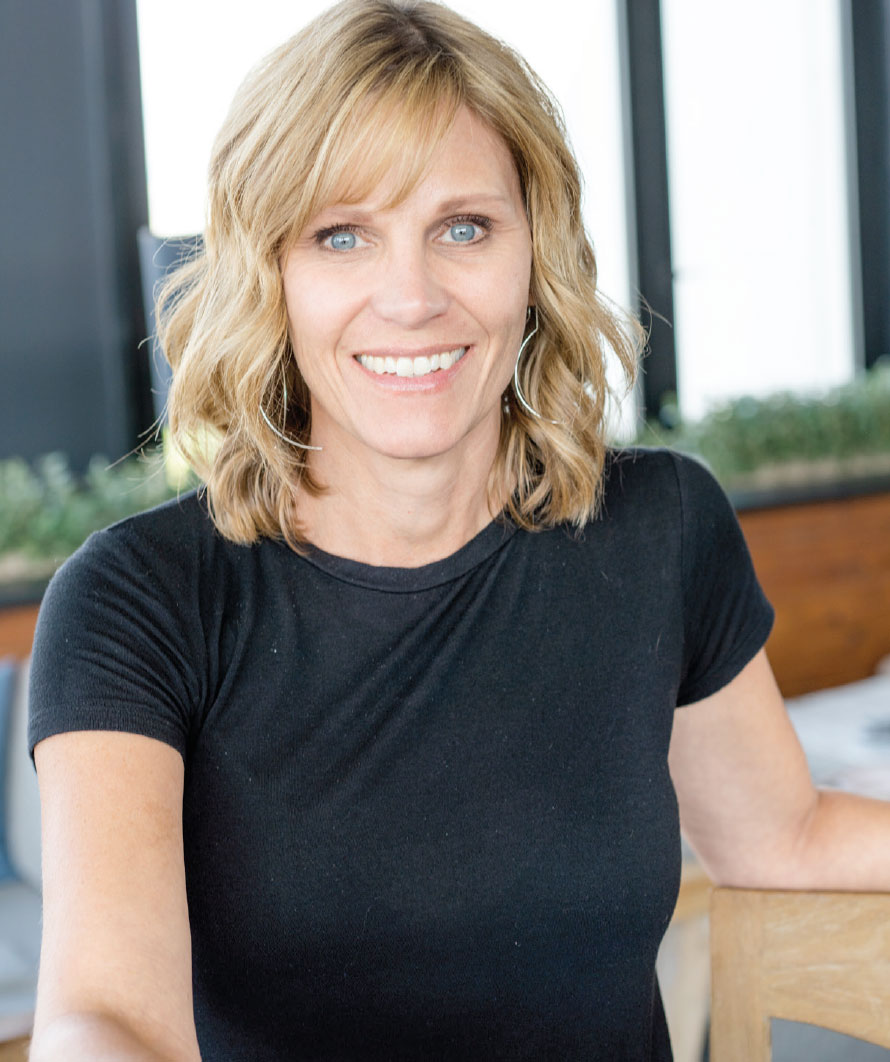
“My advice for younger women is not to let other people define you. Pursue your vision of yourself.“
–Leah Shute, Principal Architect, Studio Architects
whj: What is your leadership and communication style?
Allison: Most of the time I’m pretty straightforward and business-like, but I do value authentic and personal relationships. As I get to know the folks whom I work with, I play the in-house psychologist. I don’t know if that is a woman thing but I spend a lot of time talking to the guys… anyone from a superintendent to a sub-contractor. Being human is part of our role and part of what makes anyone successful.
Jackie: Yeah, I get that. I also feel like my teammates turn to me as a sounding board. I think the reason we’re successful is because we take a minute to treat people like humans. Not just a very straightforward, business-like directive: “Do this, this, and this. See ya.” Then send them off. I make sure to start with things like “How was your weekend? How are your kids? How was the fishing or skiing?” We bring this up because we do care. We want to know. Whether they notice it or not, it means a lot.
Allison: Personal connections will build trust and make it easier when things aren’t going well… and trust us, every day something doesn’t go well. It’s okay to get in an argument. There is something I need from you and there is something you need from me. There is a symbiotic relationship. We’ll resolve that conflict better when we’re connected on a personal level.
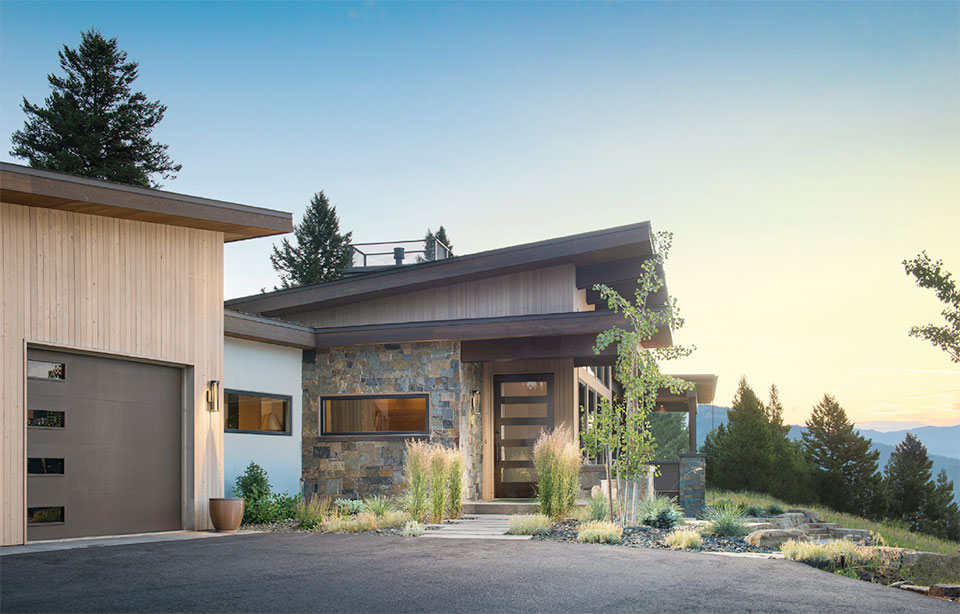
Leah: I consciously begin a relationship by being highly observant rather than being the first person to chime in or being the first to put a flag in. I’ll soak it all in. I need to understand the situation as a whole and the players involved before moving forward. I need to assess and decipher before finding the appropriate voice for the situation. Then I strive to express myself in a way that the receiver will be most likely to truly hear.
Allison: I completely understand needing to adjust one’s voice and leadership style to the situation. There is an art to it. When I first started, I thought I needed to be strong-willed, to have all the answers, to be that pain, and have that push-back. I could easily fly off the handle, but that doesn’t work very well. As Leah says, stepping back and listening is a good place to start. Understanding before reacting. I’m still working on perfecting that for sure.
Michelle: Relationships in business are everything. Whether it’s with the employee, the client, or the vendor, we put relationships first. That has really helped us to retain but also to navigate supply chain shortages because vendors are much happier to help the clients who were nice than the ones who yell and scream.
whj: How do you feel about the term “boss lady”?
Leah: I find that question funny because it would all depend on the context. I’m an older sister of two younger brothers and naturally gravitated to taking charge. I am a “boss lady” but at times more like being the “den mother.” I get people to pay attention, come together, make a plan, and execute. I’m a mother so I know how to bring the family together. But when things are clearly not right, like a structural issue with a build, I have to take charge. Hopefully, my style of being the “boss lady/den mother” creates a very positive environment for the client, design team, and construction crews.
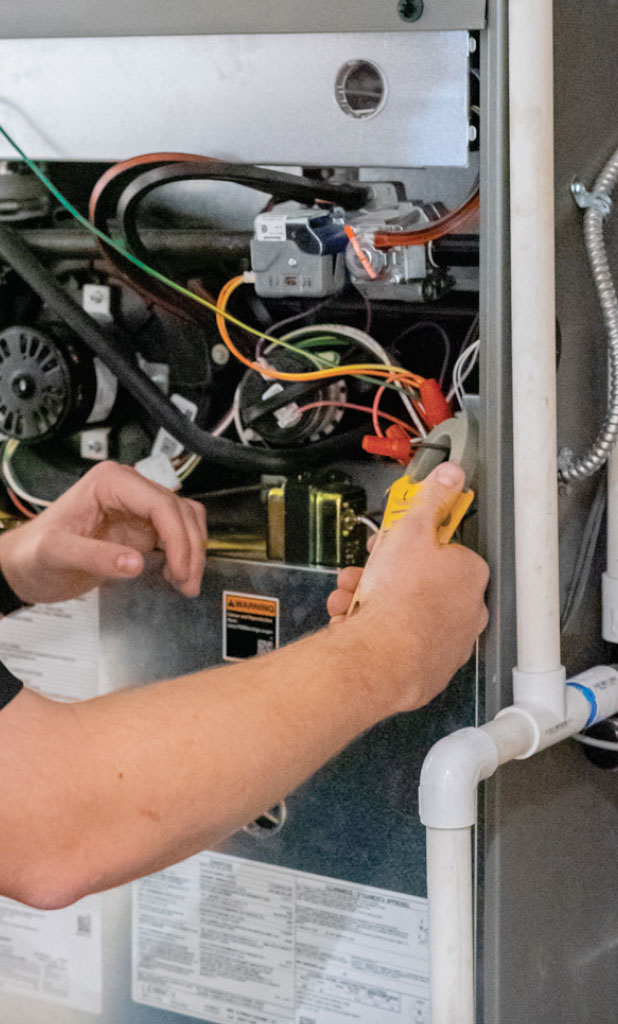
Michelle: I’ve heard the term used in a derogatory way but also in a very empowering way. I hope that someday my daughters can just be the “boss” and their gender won’t matter. Until then, I just hope I can set a good example for them and help pave the way in some small way for them to be successful in whatever career paths they choose.
Allison: I like the term boss lady and it doesn’t necessarily mean you’re “bossy,” (although I’ve been known to be time to time.) I’m not afraid to look at a situation and be able to react quickly and confidently. I would like to think that is a positive thing.
Jackie: Leah is right in that it’s all about context. I have definitely heard it used towards me in a mocking tone, but I have also heard it with a tone of admiration. I guess if I were asked how I would prefer to be addressed, then “Jackie” would be my first option.
whj: Share a project of which you’re proud.
Allison: It’s easy to be proud of the projects where things went great. When things are on time, exactly to spec, and on budget, everyone is happy. While you’d hope all the projects went that way, you don’t learn much. You don’t learn how to navigate a tough conversation.
I’m prouder of the projects that are challenging. You learn to have that difficult conversation with a client, or colleague, or supplier. At the moment, we don’t like the personal tensions but when you look back on the circumstance and evaluate how you handled it, you’re proud of how you figured it out and got the problems solved.
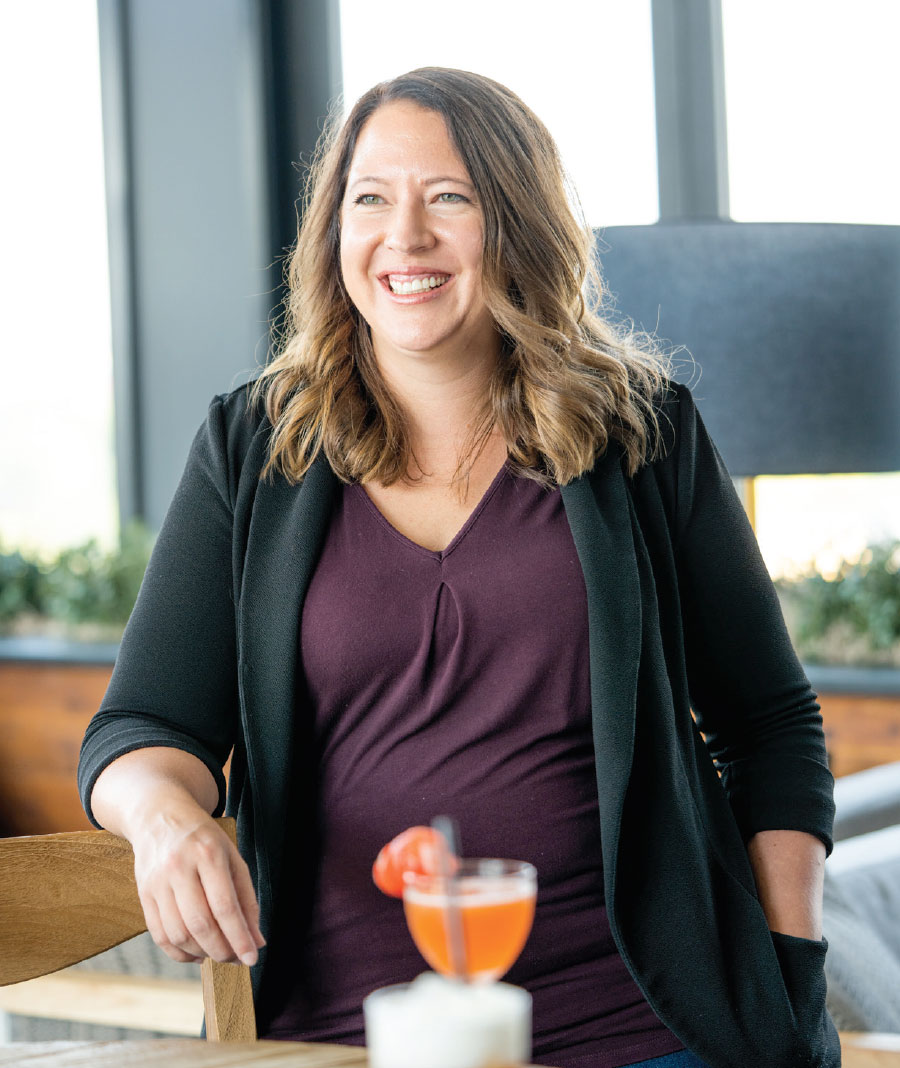
“Our biggest asset is our crew. We focus on retaining them by offering not just good pay and benefits, but also a good quality of life.”
– Michelle Dammen, Owner, Premier Air
Jackie: The reason we’re in this is because it’s hard. Always strive to be better. We like to do this work for the challenge.
Leah: As a firm, we are certainly proud of our well-conceived, high-end custom residential and resort projects. The properties are beautiful, the materials finely crafted, and designs layered with thought.
A particularly notable project is a Bozeman-area residence designed and built on a relatively modest budget. Our goal was to create a home with sustainability-driven design. As architects and builders, we all need to look at how we can better use our planet’s resources. For this project, we started by looking at how our industry is hugely consumptive and wasteful. We evaluated everything from the many layers of a flooring system to how many trips needed to be taken to the job site. During construction we reduced materials required and manpower. Post-construction, the home was more energy-efficient and tapped into geothermal and solar energy use. While the home didn’t quite achieve net-zero, it was close, and I’m proud that we did this even within the budgetary constraints.
whj: Any stories about being a woman in a male-dominated field?
Jackie: Countless times on a jobsite when I’m in the trailer in front of a computer, someone comes in and asks, “Where is the superintendent? I’m looking for him.”
I’ll say, “You’re looking at him.”
Allison: I was out with my husband and daughters and I ran into one of our new superintendents who was with his family. He introduced me as one of the “secretaries.” Of course, I had to give him a hard time and we laugh about it today.
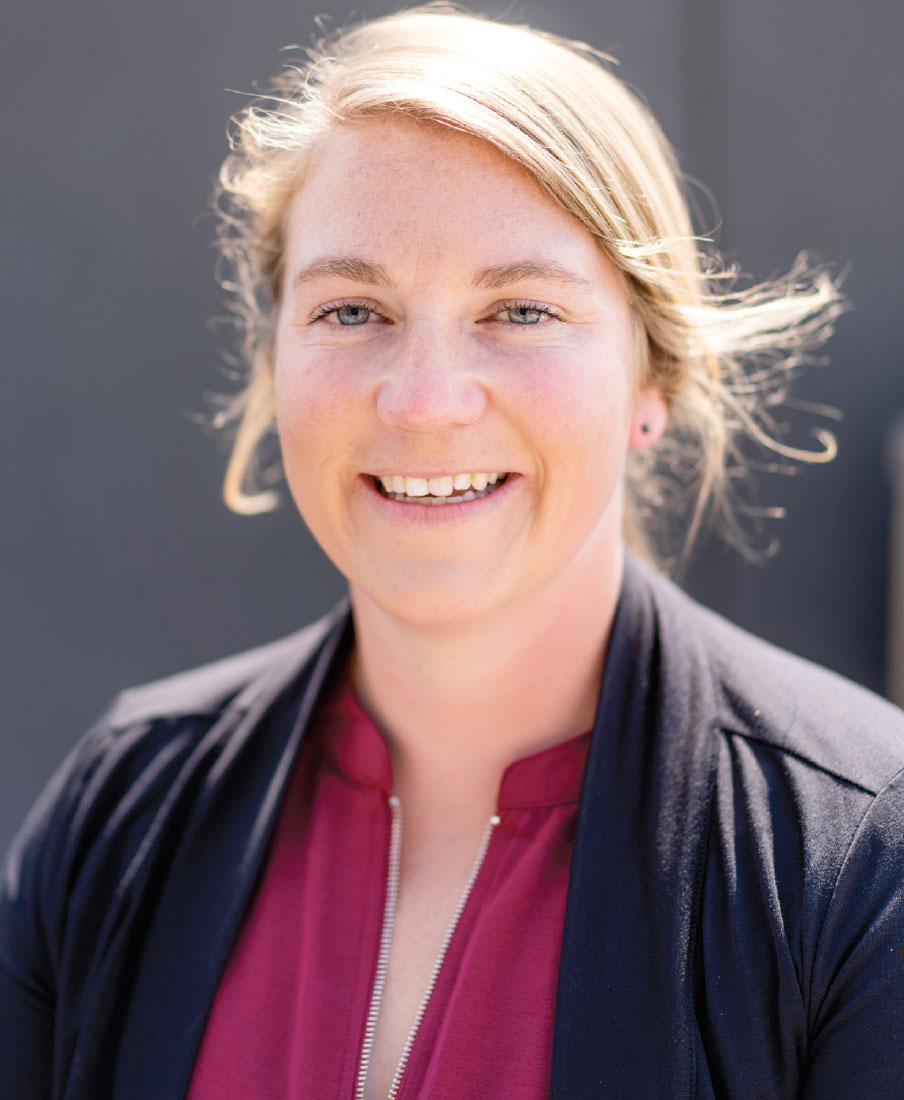
“The reason we’re in this is because it’s hard. We like to do this work for the challenge.”
–Jackie Kline, Superintendent,
Teton Heritage Builders
Michelle: People assume that I’m the wife of the owner… and yes, I’m the wife of the owner, but I’m also an owner. I can help you. I’ll be the one making the final decision. Early in our business I spent a lot of time in the field while pregnant so the reaction from other tradesmen and contractors was always entertaining.
Allison: It is unfortunate that we continue to have to counteract these stereotypes, but keeping a sense of humor and not being offended is important.
Jackie: On one hand, it is unfortunate but, on the other, it is a chance to show people that we, as women, deserve to be there. Once the ice is broken, I think people like having me onsite. I respect their questions and get them answers. Any gender hang-ups are quickly forgotten when they see I’m both competent and personable.
Leah: Still, even after all these years, I walk onto a jobsite and half the time they think I’m the real estate agent. If I’m holding plans, they’ll assume I’m the interior designer. Or if I’m dressed more professionally than normal, they may think I’m the owner, but rarely assume I’m the architect. I truly hope within my career to see that perception disappear.
Jackie: I can’t get on a piece of equipment like a forklift without someone saying, “Wow, look at you! You’re better than the guys in my shop!”
I say, “Yeah, no kidding.” They don’t realize this is a subtle form of sexism because when a man drives a forklift well, they don’t even notice, let alone say anything.
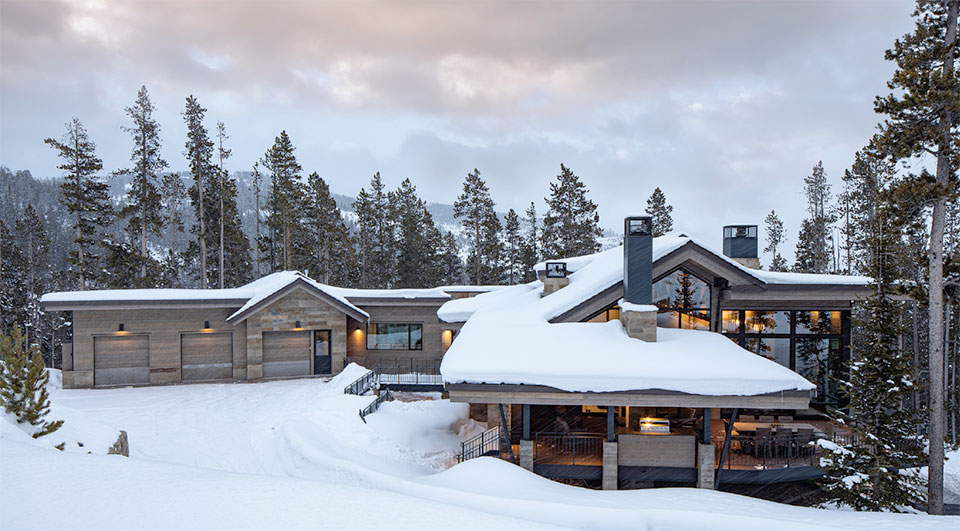
What is annoying is that sometimes people are blown away that I can do something as well as any man on the project or get them an answer to a very technical question. Why are people surprised by this?
whj: How is it working with different generations?
Michelle: With the millennial employees, my husband and I are sometimes like their parents. Parental figures. Like mom and dad. I have to take a step back and not treat them like children, but a lot of the same principles are in play. When you have a new and younger workforce, you are parenting them in some ways in the early part of their career. In general, they appreciate the advice and support we give them.
On the other hand, I have members of our work crew who are 20 years my senior. I have to find a voice that appreciates all the experience they bring but also keep them current with new technology and systems, which they sometimes don’t readily embrace. Taking the time to understand everyone as individuals creates a more functional, and fun, workplace.
Leah: One observation I have about the younger generation is that constructive criticism needs a softer touch. That doesn’t mean you ignore issues; you just talk through things more gently than you might with folks my age or older. Always be the diplomat.
Allison: Young people getting into this industry, or any industry, want to send text messages. They are scared. Email and text are easy to hide behind. Having a conversation, while it may seem more difficult, is actually more efficient and leads to better outcomes. So pick up the phone!

whj: What advice do you have for girls and young women wanting to get into the construction field?
Michelle: Don’t be afraid to get your hands dirty—often literally getting your hands dirty. Whether you want a job at the front desk or as a technician in the field, be willing to get in the crawl space and be willing to do the work. You’ll earn respect from your peers as well as a great deal of knowledge by being hands-on.
Leah: My advice for younger women is not to let other people define you. Pursue your vision of yourself. Whether you have long-term goals of being an architect or engineer or want a summer job working in a concrete yard, go for it.
Jackie: The guys on construction crews aren’t so intimidating. Most are respectful and will show a willingness to help you out. And there will be times when you will help them out. I would also suggest that you keep your eyes open for people who are willing to teach and mentor you. They will become an invaluable resource for years to come.
Michelle: Construction has its own language. We use a vocabulary that is specific to our industry. Don’t let that intimidate you. Go ahead and ask a “stupid” question. At some point every man had to ask the same “stupid” question.
Leah: For girls and younger women who want to go into architecture, my advice is to be realistic about what it takes, but also not intimidated. The schooling is grueling and architectural programs weed people out. It’s a lot like medicine or law in that architecture is a practice that requires apprenticeships and years of dedication. Architecture is a marriage of science and art and that is what I love about it. You are continually blending science, math, engineering, and art to create a very human-focused product. It is a very rewarding profession.
Allison: My advice is the same to males and females. Your job isn’t to have all the answers. While you may be in that position of authority, your role isn’t to know everything about building a house. No one does. Your job is to be comfortable enough to say, “I don’t know but I’ll find out.” That is empowering.
Leah: Women do have different sensibilities about creating space. Use those “female instincts” when designing and constructing space.
Jackie: Don’t try to “be one of the guys;” you’ll find your own unique strength by just being yourself.
